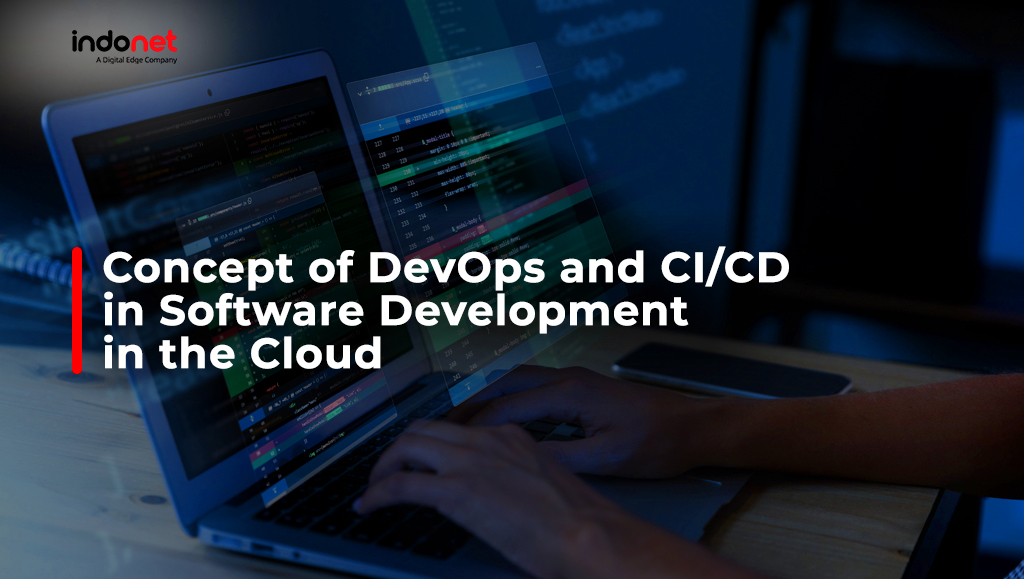The concepts of DevOps and CI/CD are two important aspects to understand in the field of technology and software development that utilize Cloud storage.
As part of the advancement of software technology, DevOps and CI/CD are highly useful in supporting various technological needs of software development. Whether it’s in the development of storage speed and data delivery or utilized to create new software projects.
Innovation is always the key in the development of technology and the digital software world. This is also the supporting pillar for the implementation of DevOps and CI/CD. How you utilize the concepts of DevOps and CI/CD in software development in the Cloud varies depending on the needs and environment of development, staging, UAT, and production.
However, in general, both can provide added value in improving productivity, reliability, and accountability in software development.
Discover how the concepts of DevOps and CI/CD can be utilized for software development in the Cloud in this article. As a collaborative approach, various software development needs can leverage the functions of DevOps and CI/CD as needed. And why the development of software technology in the Cloud needs to utilize DevOps and CI/CD together with Indonet.
Understanding DevOps and CI/CD
DevOps (Development and Operations) is a collaborative approach or philosophy in software development that combines development and operational processes.
DevOps aims to improve collaboration and communication between development teams and operational teams to achieve faster, more reliable, and efficient software development and operational cycles.
Meanwhile, what is meant by CI/CD, abbreviated from Continuous Integration (CI) and Continuous Delivery (CD), is a software development practice that emphasizes continuous code integration and automatic software change delivery to development, staging, UAT, and production environments. This term refers to two practices.
- Continuous Integration (CI): A practice involving continuous code integration by developers into a shared repository. Each code integration is automatically tested to ensure that there are no conflicts and that the changes do not break existing functionality.
- Continuous Delivery (CD): This step involves automating the delivery of software code to testing or production environments after going through the CI process. With CD, whenever there is a change in the code, the change can be automatically implemented into the production environment if it passes all tests.
The combination of DevOps and CI/CD helps organizations reduce barriers in software development and delivery, improve reliability, and accelerate responses to market changes or customer needs. The concepts of DevOps and CI/CD are well suited for software development in cloud environments. Cloud environments provide the ability to scale resources as needed.
DevOps helps manage this scale efficiently, while CI/CD supports automation in addressing capacity requirement changes. Integration and logging storage in CI/CD workflows and DevOps practices allow for troubleshooting issues that arise during the CI/CD process, as well as quickly fixing and releasing software updates.
The concepts of DevOps and CI/CD help teams manage changes more effectively, allowing for automated testing and code delivery to production environments after going through a series of testing stages. Both concepts can also be used to integrate security practices throughout the development lifecycle, helping to identify and address security issues early on.
Utilization of DevOps and CI/CD Concepts in Software Development
DevOps and CI/CD can be utilized in various contexts of software development, all with the aim of supporting team performance and software efficiency. Here are several benefits of DevOps and CI/CD in the realm of digital software technology:
- Web and Mobile Software Development: Implementing DevOps and CI/CD in web software development enables developers to quickly and automatically integrate changes, test functionalities, and swiftly deliver new versions to the production environment. DevOps and CI/CD expedite the software development and delivery cycles for mobile applications, allowing developers to swiftly produce updates or fixes and automatically deploy them to the production environment.
- Microservices Development: In microservices architecture, DevOps and CI/CD aid in managing and organizing changes in each micro module, ensuring the entire system can connect, integrate, and be deployed to the production environment.
- Enterprise Software Development: In large-scale software development, the concepts of DevOps and CI/CD assist in managing complexity, accelerating delivery time to the production environment, and enhancing overall software quality.
- Various Open Source Projects: Open-source project communities often adopt DevOps and CI/CD practices to facilitate collaboration among contributors and ensure changes can be efficiently tested and integrated.
The benefits of CI/CD enable continuous software code delivery, ensuring that open-source projects can continue to evolve and provide regular updates. With automated documentation and delivery, users and contributors can access the latest versions of the software and documentation.
The Importance of Software Development in the Cloud
Software development in the cloud offers a number of significant benefits, making it essential in the modern world of technology. Firstly, it is related to elasticity, scalability, and efficiency.
Cloud infrastructure allows developers to easily adjust resource capacity according to needs. This enables better scalability, both to respond to spikes in user access to the software or to save costs when access decreases.
Cloud computing eliminates the need for expensive physical infrastructure and high initial costs. Developers can use subscription-based or pay-as-you-go models, reducing the burden of initial costs.
Cloud services generally offer high levels of availability and reliability, with globally distributed data centers. This ensures that software can be accessed with minimal downtime.
The development of DevOps and CI/CD concepts in the Cloud Computing environment also relates to collaboration space and flexibility. Cloud computing environments enable collaboration among development teams scattered across various locations.
Developers can access resources and tools online from anywhere, increasing work flexibility. Cloud service providers have expertise and investments in high data security. By leveraging cloud security services, developers can ensure that their software is protected from security threats.
Cloud service providers also offer various other services besides computing that vary and APIs that can be easily integrated into software, including databases, monitoring tools, cloud-based security, and artificial intelligence services.
Cloud services often provide advanced technologies such as machine learning, high-level data analytics, and cutting-edge development tools that can be applied to support software development. This makes software development in the Cloud environment relatively easier to integrate in line with DevOps and CI/CD concepts support.
Overall, software development in the cloud provides the flexibility, efficiency, and competitiveness needed to meet the dynamic demands of today’s business and technology world. Enjoy the benefits of software development in the Cloud with DevOps and CI/CD concepts together with Indonet now.
By combining DevOps and CI/CD in software development in the cloud, teams can achieve high operational efficiency, improve the speed of delivering software code to the production environment, and be more responsive to changing business needs.

